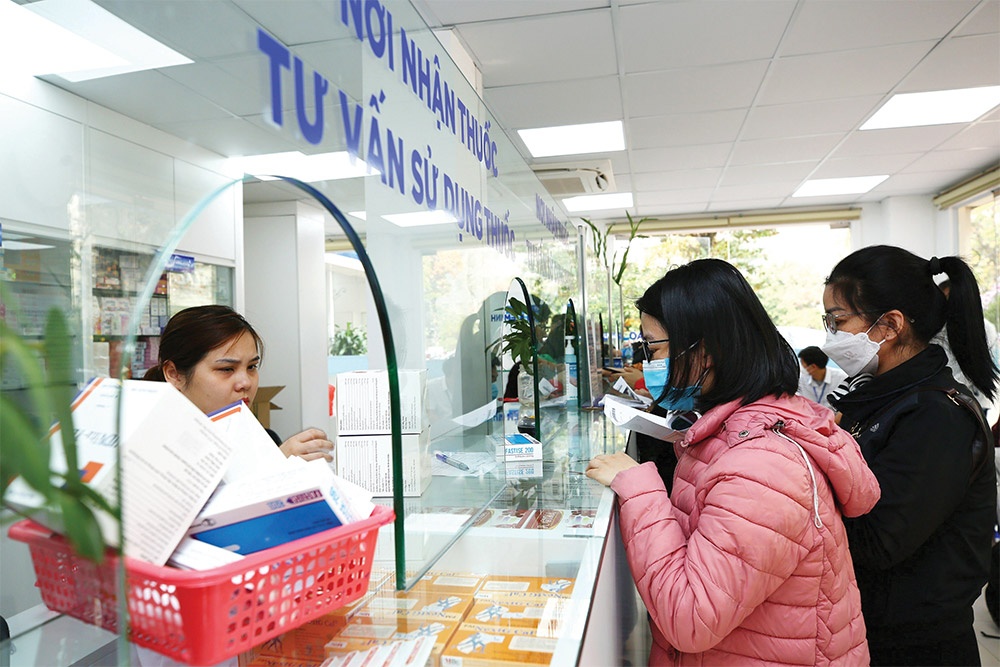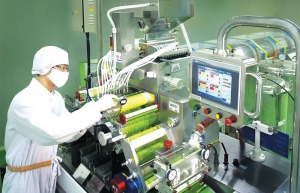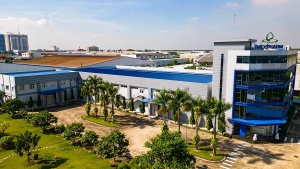Legal landscape adjusted for global pharma groups
Gregory Charitonos, chairman of the International Quality Medicines - Generic and Biosimilar Sector Committee, under the European Chamber of Commerce in Vietnam, is satisfied after hearing about a number of solutions in regards to marketing authorisations (MAs) and the rights of foreign-invested enterprises (FIEs), announced by the Drug Administration of Vietnam (DAV) at the 2024 Whitebook launch over a week ago.
 |
| Adjustments in rules regarding authorisations, admin, and tech transfer will benefit end-customers, photo Le Toan |
“These are the topics we have discussed for a considerable duration with the DAV. The responses indicate that they adopted many of our proposals, which will help to lift the procedural burdens and foster a more conducive environment for foreign enterprises like ours to invest in Vietnam and facilitate technology transfer,” he said at the launch.
“We hope that the procedures for the registration of products will be further simplified, and there will be an automatic renewal of the MA, similar to the process in Europe,” Charitonos added.
At the launch, Nguyen Thanh Lam, deputy director of the DAV, said, “We are continuing to complete the legal framework by amending the Law on Pharmacy 2016 (LoP). The Ministry of Health (MoH) has worked with the Ministry of Justice to appraise its draft amendments. They include a number of regulations on drug registration.”
In particular, the DAV will maximise administrative procedure reform related to registration of new drugs, and extension of MA.
“For this, we propose the automation mechanism, similar to what many other countries do. With this, businesses will not have to wait for issuing an extension,” Lam added. “We also invited four universities in the industry to join the appraisal of clinical records of new drugs registration. From July 2023, we apply IT in drug registration from submission of documents, appraisal to licensing.”
Regarding the expansion of the rights of FIEs, which has been among their top concerns among multinational corporations in the industry, Lam said that the amended LoP clarifies some content related to distribution rights of FIEs, facilitating and encouraging transfer of production and tech in Vietnam.
“Expansion of some other rights of FIEs is being proposed to the government. They include the rights to import excipients and materials to supply for factories doing outsourcing and technology transfer,” he said
The Law on Bidding took effect on January 1. At present, the MoH is completing a circular to guide the bidding at state-owned health facilities. “We still maintain a price negotiation process along with bidding packages of brand-name drugs,” Lam said.
According to the DAV, over the past two years, the MoH has revised a number of legal documents towards simplifying administrative reform and improving state management efficiency in drug registration.
To deal with problems related to MAs and ensure the continuation of production and supply of drugs in the country, the MoH submitted for approval and issuance of a resolution to extend for drugs with expired MAs to the end of 2024.
These latest announcements are good news for multinationals, as MAs and the expansion of the rights have been among top concerns for years. “We recognise the exigency of extension in MAs. To this end, we urge the revision of the LoP to streamline processes,” said Charitonos of EuroCham.
“Our recommendations encompass the establishment of clear guidelines, feasible timelines, and accountability mechanisms for delays – all slated for implementation by January 2025. We underscore the immediate implementation of select regulations upon the LoP’s enforcement to preclude potential drug shortages.”
He added that it expects to address constraints imposed on foreign-invested pharmaceutical enterprises.
“Our emphasis lies in the expansion of our rights and the revision of tender regulations to enhance the attractiveness of the Vietnam market. Furthermore, we advocate for incentives supporting localised production of high-quality products, a measure designed to attract heightened foreign investment and stimulate innovation within the sector,” he said.
Regarding generic drugs and biosimilars, the sector committee advocates for early issuance of guidance, specific definitions within the LoP, intensive healthcare professional training, and extended educational initiatives. These endeavours are envisioned to enhance comprehension and utilisation of biosimilars in clinical practice, ensuring a diverse range of effective treatments for patients.
Vietnam’s pharmaceutical market is being valued at about $6.4 billion a year. BMI Research forecasts that the market will reach over $16 billion by 2026, with a compound growth rate of up to 11 per cent.
According to the Vietnam Pharmaceutical Companies Association, by 2022, Vietnam had 51 foreign-invested pharmaceutical enterprises, 228 enterprises meeting WHO-GMP standards, and 12 enterprises meeting high GMP standards. As recently as 2017, only two enterprises achieved such standards in Vietnam.
 | Local pharma giants reaping rewards with new strategies While the shift to the hospital channel brought fruitful results for major pharma players in Vietnam in 2023, competition is forecast to heat up in the future. |
 | Domestic pharmaceutical products anticipate 2024 boost 2023 witnessed many fluctuations in the economy, with various industrial fields witnessing negative growth, but the pharmaceutical industry remains growing thanks to the breakthroughs of leading pharmaceutical companies. |
 | A more conducive environment needed for investors Last year marked Pharma Group’s 25-year journey of partnership in Vietnam. That year was even more significant for healthcare as we have witnessed several key laws issued with great improvements, notably the Law on Bidding and the Law on Medical Examination and Treatment. |
What the stars mean:
★ Poor ★ ★ Promising ★★★ Good ★★★★ Very good ★★★★★ Exceptional
 Tag:
Tag:
Themes: Healthcare Platform
- PM outlines new tasks for healthcare sector
- Opella and Long Chau join forces to enhance digestive and bone health
- Hanoi intensifies airport monitoring amid Nipah disease risks
- Cosmetics rules set for overhaul under draft decree
- Policy obstacles being addressed in drug licensing and renewal
Related Contents
Latest News
More News
- PM outlines new tasks for healthcare sector (February 25, 2026 | 16:00)
- Myriad risks ahead, but ones Vietnam can confront (February 20, 2026 | 15:02)
- Vietnam making the leap into AI and semiconductors (February 20, 2026 | 09:37)
- Funding must be activated for semiconductor success (February 20, 2026 | 09:20)
- Resilience as new benchmark for smarter infrastructure (February 19, 2026 | 20:35)
- A golden time to shine within ASEAN (February 19, 2026 | 20:22)
- Vietnam’s pivotal year for advancing sustainability (February 19, 2026 | 08:44)
- Strengthening the core role of industry and trade (February 19, 2026 | 08:35)
- Future orientations for healthcare improvements (February 19, 2026 | 08:29)
- Infrastructure orientations suitable for a new chapter (February 19, 2026 | 08:15)





















 Mobile Version
Mobile Version